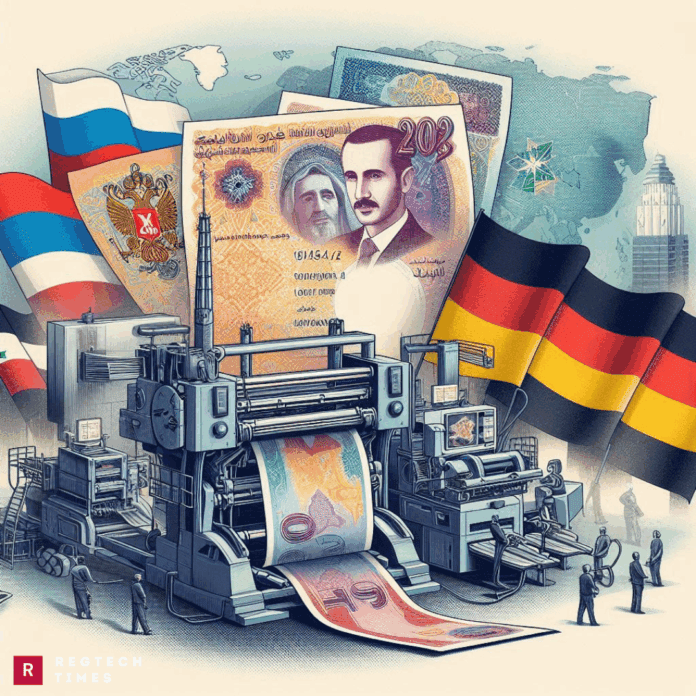Syria is planning a major change in how it prints its money. For years, the country has relied on Russia to produce its banknotes. However, Syria is currently in negotiations to move that work to Germany and the United Arab Emirates (UAE). This is a huge step that shows Syria is trying to build new friendships and reduce its dependence on Russia.
The Syrian government is talking to a printing company in the UAE to produce the new version of the Syrian pound. At the same time, two companies in Germany have also shown interest. One is run by the German government and the other is a private company. However, the German government firm has said that it’s not in official talks yet.
This change is happening as Syria recovers from more than a decade of civil war. During those years, the country faced serious money problems, including shortages of banknotes and heavy international sanctions. Because of these sanctions, Syria couldn’t use European printers and had to rely on Russia.
But things are different now. The new leaders of Syria are beginning to gain favor with some Western and Gulf nations. In February, the European Union relaxed some sanctions, allowing Syria to print money with companies in Europe again. This opened the door for Syria to consider new printing partners like the UAE and Germany.
A New Look for Syrian Banknotes
Along with changing where the money is printed, Syria is also planning a redesign of its currency. One of the biggest changes is the removal of a well-known face from one of the most-used notes — a purple-colored bill. The note will no longer feature the image of the former president, who fled to Russia late last year.
Syria has been struggling with a shortage of banknotes for quite some time. People have noticed that there are not enough bills in circulation. Some officials say this is because many people are keeping their money at home instead of in banks. Others believe that the government is controlling the flow of cash to help manage the exchange rate.
Spy Parcel Terror: Arrests of Ukranians in Germany, Switzerland Unveil Russia’s Freight Warfare Plot
This shortage has made life hard for many people. Banks are often unable to give customers access to their savings. Businesses are also having trouble paying for what they need. At the same time, the economy is being squeezed by a flood of cheap imported goods.
The Syrian pound’s value has suffered greatly as a result. One US dollar was worth roughly fifty Syrian pounds prior to the start of the war in 2011. One dollar is now worth almost 10,000 Syrian pounds on the underground market. However, this is actually stronger than it was before the leadership change, when the pound traded at about 15,000 per dollar.
Global Support and New Deals
Another aspect of the two nations’ developing ties is Syria’s decision to print money in the United Arab Emirates. Just recently, Syria signed a deal with a major UAE company to develop the port of Tartus. The deal is worth $800 million and is the first of its kind since U.S. sanctions were eased. It shows that Syria and the UAE are becoming closer economic partners.
At the same time, international support for Syria is also growing. The World Bank announced that Syria has cleared its unpaid debts, thanks to help from Saudi Arabia and Qatar. Syria owed the World Bank about $15.5 million. Now that the debt is paid, Syria is once again eligible for loans and grants from the bank. These funds will go toward rebuilding the country after many years of war.
Kremlin Wall Cracks: Longtime Holdouts Hungary and Slovakia Endorse Russia Sanctions
The first project planned by the World Bank in Syria will focus on improving electricity. This is a major need for the country, as reliable power is essential for hospitals, schools, and clean water. The World Bank says it will work with other countries to raise money for more projects that help Syrian people.
While Russia is still providing Syria with some support — like shipments of fuel and wheat — its influence seems to be shrinking. Syria’s new leaders are clearly looking to form stronger ties with other parts of the world. The decision to stop printing money in Russia is one of the clearest signs of that shift.


